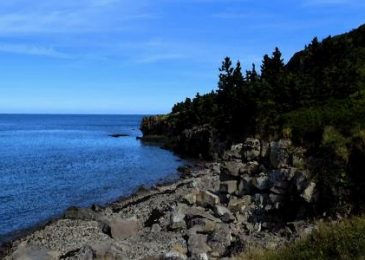KJIPUKTUK (Halifax) – The Whites Point Quarry continues to make waves, almost ten years after the proposal to expand a small existing gravel quarry and construct a marine terminal on the shores of Digby Neck was turned down by a joint federal and provincial tribunal.
People will wonder if opposition is worth the bother if later on a bunch of lawyers are going to sit down and overturn the decision. Gretchen Fitzgerald, Sierra Club Atlantic
In the latest round the federal government is appealing to the Federal Court an international trade tribunal ruling that deemed the initial decision to withhold environmental approval illegal. Both the East Coast Environmental Law Association (ECELAW) and the Sierra Club Canada have been granted intervenor status.
The battle that won’t go away
“It’s the battle that just won’t go away,” says Gretchen Fitzgerald, director of the Sierra Club Atlantic chapter. “We were involved in the opposition to the quarry from the beginning. We were worried about the consequences of the shipping traffic on the Right Whale and other mammals.”

Risk to the environment posed by the 120 hectare quarry and the shipping traffic it would generate in the ecologically sensitive St Mary’s Bay and the Bay of Fundy were among the reasons leading to the initial decision not to approve the quarry and shipping terminal.
But that wasn’t the end of it. In 2013 Bilcon, the American company behind the quarry proposal, appealed that decision to a North American Free Trade Agreement (NAFTA) tribunal,arguing that the the decision to withhold approval was based on factors outside Canada’s environmental legislation.
The NAFTA tribunal agreed with Bilcon, and earlier this year allowed the company to seek more than $130 million in damages from Canada.
Appealing the appeal
Now Canada has applied to the Federal Court of Canada to set aside that ruling, arguing that the NAFTA tribunal exceeded its jurisdiction.
“We argue that it is not the business of NAFTA tribunals to make a determination on what an environmental assessment panel decides. Canada’s constitution protects these types of panels from these reviews. That makes it a very important case for a lot of other similar projects,” says Fitzgerald.
Fitzgerald is not suggesting that the quarry will go ahead after all, but she is concerned about the chilling effect such decisions could have on future provincial or federal environmental tribunals.
“Public servants will be aware of the risks of rejecting projects, community members will be aware of it. People will wonder if opposition is worth the bother if later on a bunch of lawyers are going to sit down and overturn the decision,” Fitzgerald says.
Tell the government not to settle
Fitzgerald is asking supporters to tell the Canadian Government not to settle.
“We have not heard anything specific about settlement being in the works, but these things usually happen without much fanfare. When you look at Canada’s history of settling disputes, and assuming that probably there are pressures like that, we felt that we needed to raise this proactively,” Fitzgerald explains.
The extent of the response to Fitzgerald’s request to send letters to Canada’s Ministers of International Trade, Foreign Affairs, and Environment and Climate Change to encourage Canada not to settle this case.
We know that 1200 letters were sent already in a very short time, says Fitzgerald.
“That’s a lot of people, Especially when you consider that it’s summertime, and that it’s a complex issue. But people get this and they understand what is at stake,” she says.
Not the only NAFTA appeal of an environmental decision
This is not the only appeal by a foreign investor to challenge Canadian environmental laws and decisions under NAFTA.
A 2015 report by the Canadian Centre for Policy Alternatives documents challenges to a ban on fracking by the Quebec provincial government, provisions to promote the rapid adoption of renewable energies and a moratorium on offshore wind projects in Lake Ontario as NAFTA appeals with many similarities with the Bilcon case.




This was clearly foreseen when NAFTA was being promoted in the first place. It was said that international players would not be able to overturn sovereign Canadian decisions. Guess what happened? Maybe Donald Trump IS right about NAFTA!
The quarry as described is an exact replica of an operation that continued near to here for fifty years, or more. When it was operative, the quarry employed rock crushers to make gravel for concrete out of the granitic diabase, or trap rock, as it is called locally. The rock crushers are noisy and dusty, and the dust is a particular hazard to those with any sort of pulmonary conditions or distress. Blasting kept people on edge the entire time it was in operation, and the shocks could be felt five miles away, where I lived. The area is useless, now, since the quarrying was discontinued before it reached the depth where water had to be pumped. That means, it never became a water feature, as was promised, and is just a huge flat expanse of rocky wasteland on both sides of a highway that climbs the hill that was destroyed in the quarrying process.